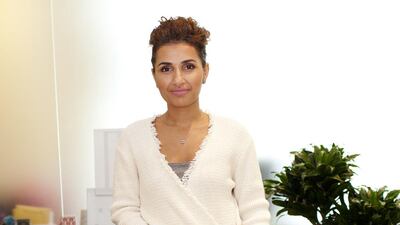Melika Yazdjerdi is director of Dubai Watch Week, a five-day educational and cultural event featuring talks, workshops and exhibitions dedicated to craftsmanship and innovation in horology. It begins its second edition in DIFC and The Dubai Mall, on Tuesday. Born in Iran, Ms Yazdjerdi moved to Dubai in 1983 and now lives in Dubai International Financial Centre with her husband.
6am
I am an early riser. I work out for an hour and try to do that six days a week. Before Dubai Watch Week (DWW) I work out after work, but I’ve had to switch to morning because I don’t know what time I’ll leave the office at the moment. I try to vary it; I go to sunrise yoga, or I exercise at home or go to the gym. I sign up to different classes, all really early in the morning.
7am
I have a very healthy diet. Five days a week is my strict diet policy. Two days are my cheat days. For breakfast, I’m really big into juicing, so it could be vegetable juice in the morning. I’m lactose intolerant so I tend to have non-gluten cereal with almond or coconut milk or I do chia seed pudding. I like to cook, so I have my meals set for the day. When I leave for work I have my breakfast and my lunch with me.
8am
I live in the same building I work in. Sometimes I get in at 9am, depending on whether I’ve left at midnight previously. For two hours I’m answering emails and structuring the day, depending on emails I’ve received.
10am
I’m not big on meetings but anything I set up I tend to club together between 10am to 3pm, so then I can go back to the rest of the day. With DWW I get 200-300 emails a day, so sticking to a regiment is important.
12.30pm
Lunch has to be between now and 1pm. I’m very strict about that. It could be salad with a piece of protein, probably fish but mainly vegetarian. I will be eating at my desk 95 per cent of the time. It’s not healthy because I like to switch off, but I can eat and multitask and start going through documents. Because I have a lot of emails to respond to and my phone is ringing all the time, every minute I step away is crucial – especially before DWW.
1.30pm
DWW is happening literally a few minutes’ walk away from the office, so I head to the site. We are three or four times a week, looking at aspects of the programme with the events team or suppliers, discussing different logistical aspects, especially as the second edition is three times the size of last year. There’s a lot of programming to look into and a month before the event we start weekly meetings with a different partner or supplier, individuals or organisations, mainly as site visits.
3pm
I talk to journalists overseas. We have more than 50 speakers coming, so there’s daily correspondence with them about what they’re going to be speaking about and their schedule while here.
5pm
It’s more conference calls. We’re flying in more than 120 people this year, including the speakers, so logistically it’s a big event. There are a lot of conversations that happen. Because we work within so many time zones we have conference calls at different hours of the day. Also I look at what has been done or achieved, because that sets the tone for the next day.
8pm
The week before DWW I don’t leave the office before this time. We work really long hours; for an event of this size we have a small team so try to maximise everybody’s timings. Everybody generously puts in a lot of extra hours. Wednesday or Thursday I tend to stay until 10 or 11 o’clock.
8.45pm
I serve dinner. When I’m preparing meals I try for 30 minutes maximum cooking time, so I don’t do anything elaborate. I avoid carbs so I do a roast chicken with roast vegetables on the side. Maybe quinoa. I’ll also work on my meal for the next day.
10pm
I spend two hours with my husband. We both enjoy TV shows, especially British ones. My husband is a Liverpool fan. If there’s a football match on, while he’s watching, I sit on the sofa and read a book, currently Kafka on the Shore, by my favourite author Haruki Murakami.
12am
Bed. I’m not getting my eight hours right now, but I make up for it at the weekend.
business@thenational.ae
Follow The National's Business section on Twitter

